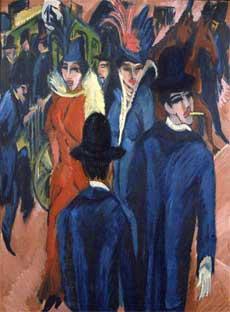Kirchner's "Berlin Street Scene": a Case in Controversy
Persecuted for being Jewish, the Hess family was forced to flee Germany in 1933. Three years later, a selection of paintings from the Hess collection, including "Berlin Street Scene" by Ernst Ludwig Kirchner, was sold in Cologne. In 1980 the painting came up for sale again; at that time it was acquired the Brücke Museum Berlin. When Anita Halpin, heir to the Hess estate, requested the restitution of "Berlin Street Scene"; the museum needed to decide whether the sale of the painting in the 1930s was forced or voluntary. Following two years of negotiations, the German government announced that the painting would be transferred to Mrs. Hess on reimbursement of a sum equivalent to that paid for by the museum for the painting almost thirty years earlier.
The decision to surrender the painting, praised by many, was harshly criticized by some German politicians and certain vocal public. The critics believed that the sale of the painting took place due to the economic depression in Germany and not due to persecution of the Jewish families in the years preceding the World War II. While various experts affirmed that the State of Berlin had made the right decision to return the painting to the heirs of Alfred Hess, others have questioned the wisdom of its return.

Ernst Ludwig Kirchner, Berlin Street Scene (1913)
1913
Press & Scholarly
Press & Scholarly
Background Information
- Provenance and Brief History of Kirchner�s "Berlin Street Scene", November 7, 2010
- Statement by Attorney Dr. Jost von Trott zu Solz Regarding the Restitution of "Berlin Street Scene", June 14, 2007
- Expert Opinion Finds Kirchner�s �Berlin Street Scene� Painting was Correctly Returned to Hess Heir, June 14, 2007
Affiliated with the World Jewish Congress
Commission for Art Recovery, Inc. | © 2016 All Rights Reserved | Site Index
